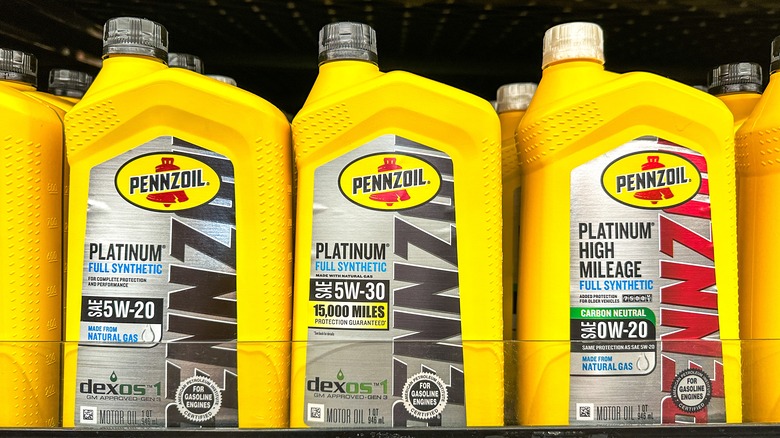When Should You Start Using High Mileage Engine Oil & Are There Any Disadvantages?
We may receive a commission on purchases made from links.
If your vehicle is due for an oil change, the oil of choice is either synthetic or conventional motor oil. But if your car's odometer is over 75,000 miles, upgrading to high-mileage engine oils would enable you and your vehicle to reap long-term benefits by reducing engine wear, improving fuel economy, and maintaining a smooth-running engine.
I had an eighth-gen Mitsubishi Galant with a single-overhead-cam 4G63 engine, and the odometer was at 70,000-plus miles when I got it. The engine and transmission ran great, but there were small oil leaks around the valve cover and under the motor. My mechanic recommended high-mileage motor oil and an original-equipment-quality oil filter, and the engine ran quieter, drank less fuel, and had fewer oil leaks.
After a few months, we had to replace the valve-cover oil seal and a few gaskets to rid the engine of leaks, but my experience with high-mileage engine oils has been positive. There are caveats to consider before upgrading to high-mileage engine oils, but if done right, the positives outweigh the negatives.
What is a high-mileage vehicle?
What car owners consider "high mileage" depends on many factors. Lubricant manufacturers like Valvoline and Castrol recommend their high-mileage engine oils for vehicles with over 75,000 miles on the odometer. Then again, a city-based automobile's 75,000 miles would be considered "hard miles" since research suggests "highway miles" are less stressful on an engine than "city miles."
This means that a city car with 75,000 miles could have as much wear and tear as a mostly highway-driven car with 130,000 miles. Periodic maintenance is also a significant factor. Vehicles that received periodic oil changes would have less wear at 120,000 miles than lower-mileage cars that skipped oil changes.
For argument's sake, any vehicle with over 100,000 miles on the clock could fall into the high-mileage category. That's also when external or internal parts begin to wear, decay, or loosen, like the many O-rings, gaskets, and seals required to leakproof any engine against losing precious oil.
High-mileage engine oils: The Pros
High-mileage motor oils have more additives than standard synthetic oils. Depending on the manufacturer, high-mileage engine oil has more seal enhancers and proprietary additives to lubricate and condition the engine's seals, gaskets, and O-rings, letting them "swell" back into shape and helping minimize or stop oil leaks and extreme oil consumption. Moreover, high-mileage engine oils have more detergents and antioxidant compounds to prevent sludge and maintain a cleaner engine.
Another pro is more anti-wear agents that protect your engine's moving parts for longer. It's why most high-mileage motor oils (like Castrol EDGE High Mileage 5W-30 or Pennzoil Platinum High Mileage 5W-30) claim to last 15,000 miles or one year between oil changes. Advanced anti-wear additives, detergents, and viscosity modifiers make it possible to clean and protect your car's engine as the miles add up.
However, it's still best to adhere to the owner's manual regarding your car's recommended oil-change intervals. Every 5,000 to 7,500 miles is generally how often you actually need to change the oil in modern cars.
High mileage engine oils: The cons
The main disadvantages of using high-mileage engine oil are that your engine could be hard to start during cold weather and that you may face unusually high oil pressures (especially if using high-mileage oil with a thicker viscosity rating). Stick with the manufacturer's recommended motor-oil viscosity classification. For instance, if your car uses 5W-30 synthetic oil, upgrade to high-mileage oil with a similar 5W-30 rating.
Another drawback is the extra cost. Since high-mileage motor oils have advanced formulas with more detergents, viscosity modifiers, and anti-wear properties, they cost more than comparable synthetic motor oils. For instance, five quarts of Mobil 1 Extended Performance 5W-30 High Mileage Motor Oil costs $32.47 (it's currently on sale on Amazon for $29.97), while five quarts of Mobil 1 Advanced Full Synthetic 5W-30 costs only $29.97 (on sale for $27.97). The price difference is minimal, though, and the longer oil change intervals and leak-eliminating properties are worth the extra penny.
Lastly, high-mileage motor oils cannot fix engine issues like loss of power, blow-by, a misfire, or address strange engine noises. If your high-mileage engine has mechanical faults, it's better to fix them before upgrading to high-mileage motor oil.



